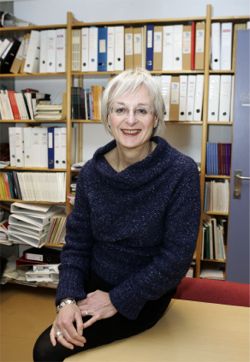Economic rewards for hiring of women
The Committee for mainstreaming – Women in Science asks the Ministry of Education and Research to consider economic rewards to institutions that hire women as associate professors and professors. If the Ministry follows this advice, Norway will be the first country with such a model.

Today, the Committee for Mainstreaming – Women in Science (the Kif-Committee) hands in its final report to the Ministry of Education and Research. The committee was established for a three-year period by the Ministry in January 2004. The Committee’s mandate has been to work toward integration of gender equality in the research sector. In the report handed to the Ministry of Education and Research today, the Kif-Committee presents their recommendations on what measures will improve the gender balance in universities and colleges.
Increased budgets when hiring women
One of the central suggestions from the Committee is that the Ministry should consider integrating gender equality in the financial system of the research sector. The Committee recommends a model based on finance-by-unit, where the institutions are encouraged to hire women in permanent academic positions through the use of economic incentives. The idea is that each hiring of a woman will lead to increased financing from the Ministry.
"If we are to reach the gender equality goals, we will need new and stronger measures. In today’s financial system we reward the accumulation of study-points and publications, while we believe that improved gender balance should be rewarded. Statskonsult has explored these options on behalf of the Committee and presented several models for which we now request the Ministry’s consideration, says Kari Melby," leader of the Kif-Committee.
In addition, the Committee recommends for the Ministry to set aside funding earmarked gender equality measures to improve women’s share of academic positions at universities and colleges.
Earmarking
The Kif-Committee also recommends that the Ministry map the possibilities for affirmative actions for the underrepresented gender because the EFTA-verdict of 2003 has prohibited the earmarking of academic positions. The background for this advice from the Committee is that the EU countries have different practices and understandings of the range of possible measures after this verdict.
"We have received information that suggests that Norway may have a stricter interpretation of the EFTA-verdict than what is the practice in different EU-countries. We therefore believe that it is important to clarify the limits for legal measures directed toward an underrepresented gender," says Melby.
Continuation of the Committee
The Committee has also recommended that the Ministry carry on with a national committee for gender equality in the research sector. Minister of education and research, Øystein Djupedal, has already confirmed that the Ministry will go along with this recommendation and establish a new committee for a three-year period.
Translated by Nicholas Vikør Green, KILDEN
In the report, “Gender balance in higher education and research – golden opportunities”, the Committee for Mainstreaming – Women in Science gives recommendations for further gender equality work in the research sector. The report – addressed to the Ministry of Education and Research - also summarizes the development of the gender balance and gender equality work in academia the past few years, and provides an overview of the committee’s activities during its tenure.